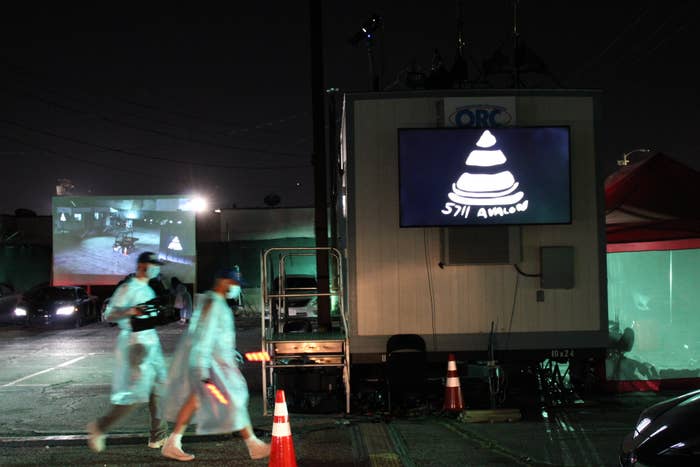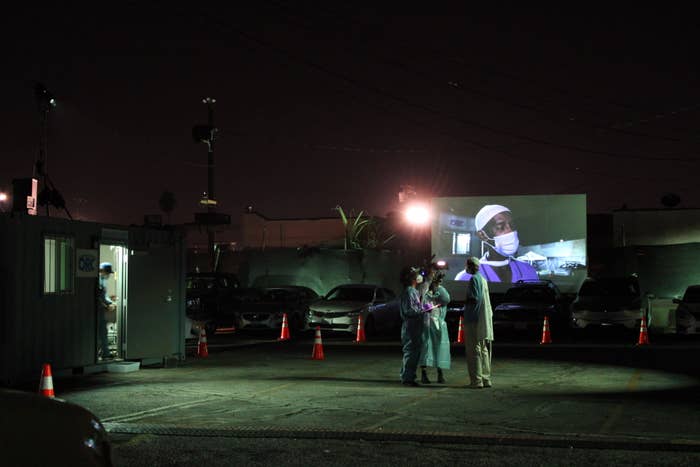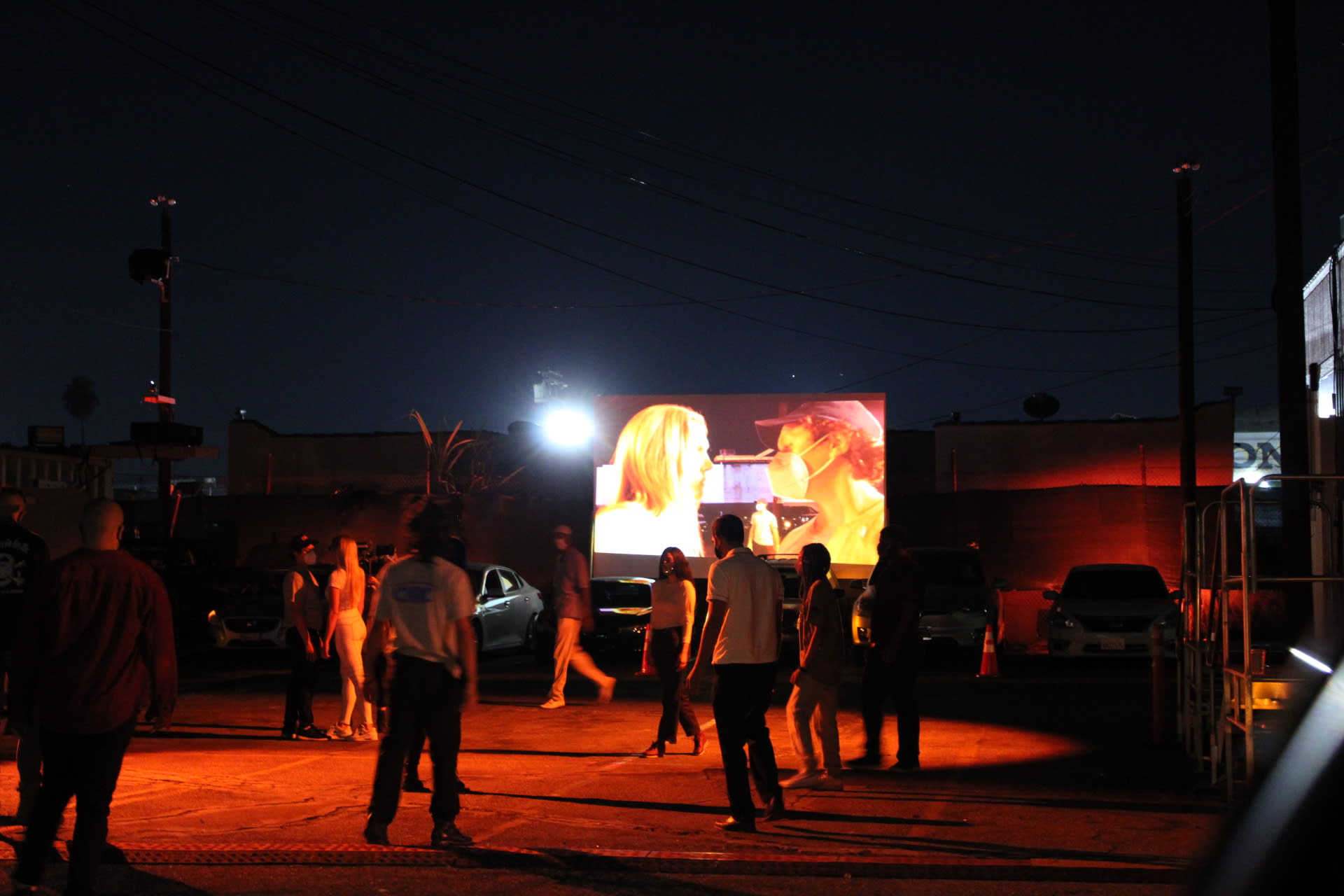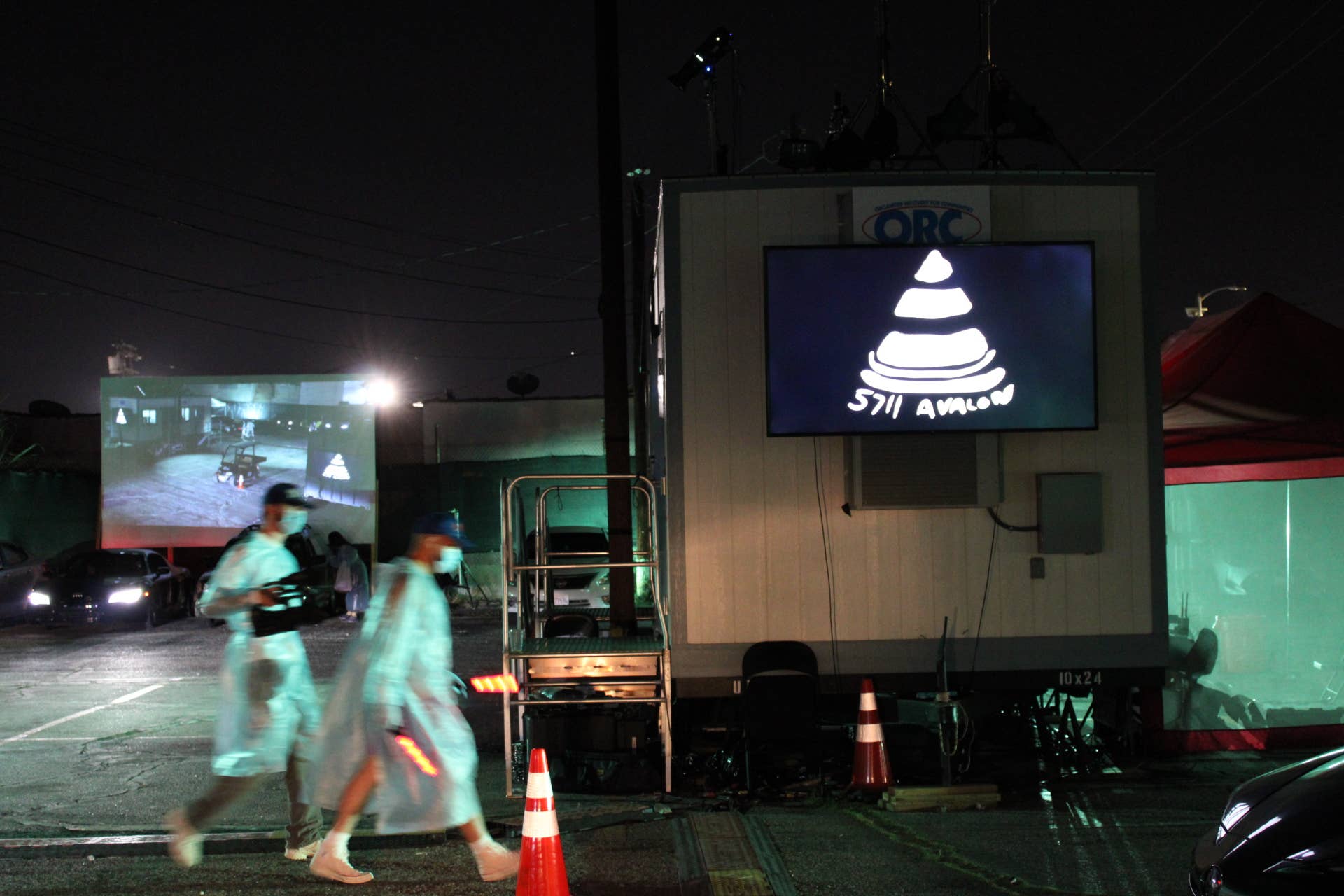
Shia LaBeouf wants to extend the playground.
This is the elaborate metaphor the 34-year-old actor and writer used during a 2019 interview with MTV News’ Josh Horowitz to explain the creative catalyst and ethos behind Slauson Rec, the local theater company he co-founded in South Los Angeles with Tax Collector castmate Bobby Soto and neighborhood kingmaker Bojangles.
And it’s most certainly a critical mission. Even before COVID-19 exposed the moral rot at the core of our public institutions and magnified already widening social and economic inequalities, the arts were increasingly becoming a luxury. Slashed public school budgets and a culture of privatization and exclusion all but priced folks out of access to readily available theater, literature, or the humanities. Hell, just having the free time and space to explore your creativity, to look inward and reflect, and to create have become privileged commodities—it’s difficult to spend hours writing or dancing or painting when you have to work three different part-time gig economy jobs to pay your medical bills and rent. Escapism is reserved for those who can afford it. That’s why for most of history, theater has been, as LaBeouf puts it, just “white men alone in a room writing for other white people to watch.”
Slauson Rec Theater Company has been quietly working the past 18 months to reverse this course. Drawing from the robust talent pool of the neighborhood that bestowed its namesake, Slauson Rec’s cast and crew reflects the neighborhood it took root in, shining a spotlight on the overlooked Black and Latinx working-class talent that the myth of meritocracy left behind.
Another element of Slauson’s creative drive helping tear down the old guard gatekeeper’s firewalls is its continuation of the Devised theatre traditions of Moisés Kaufman. Devised theatre encourages a more democratized approach to the form, fostering a purely collaborative, egalitarian environment where everyone has a say, everyone is the writer, everyone is the director. It dissolves the traditional hierarchies that are inherent in the compositional process—there are no Executive Producers delegating tasks to below the line talent; no sole authorial voice dictating plot or tone or theme. The entire theater company has equal input on how they explore where the play goes next, creating fluid moments in real time— literally reflecting the current moment—instead of rigid story beats. All the players involved are a single unit, both the parts and the whole. They are the means of production.
This communal spirit and snapshot of our collective present moment is on full, indelible display in 5711 Avalon, the troupe’s first play, which Complex was able to see last weekend. Adhering to socially distant COVID safety precautions to protect both the viewers and the players, the play was performed in a vacant lot at the eponymous address of the title, a quiet residential neighborhood in South L.A. at the intersection of Slauson Ave and Avalon to be observed by an audience in their cars, drive-in style.
Avalon—which offers a slice-of-life look at a team of frontline lab technicians working a shift at a COVID testing site and the revolving door of patients they encounter—is both a technical and metatextual achievement. Any skepticism that I might’ve had about the psychic distance of viewing what was supposed to be intimate, immersive theater from an isolated vehicle diminishing its impact or softening its visceral immediacy quickly evaporated as I idled in line behind a sea of red brake lights awaiting entry into the lot. The ushers and stagehands who directed traffic and distributed program literature were head to toe in medical-grade PPE, face shields, and gloves, which surreptitiously recreated the anxiety and disorientation I feel whenever I’m waiting in a line of vehicles inching forward at a glacial pace through Chavez Revine approaching the gates of Dodger Stadium to get a real COVID test. The play had already grounded me in its objective reality, its thematic orbit pulling me in before the proverbial curtain had even lifted.

Once parked, it didn’t take long to decipher the sense of geography of the lot’s stage, as it looks familiar to anyone who frequents expansive outdoor testing facilities. There were two nondescript trailers, golf carts transporting the lab techs and nurses, and various tents containing the testing equipment. The action is clearly visible from your car—with the audio being broadcast through a predetermined radio station—but with the help of projectors strategically placed throughout the lot, you get a bird-on-a-wire glimpse at the action unfolding in different locations of the narrative. It creates an exciting immersive tapestry of individual moments that congeal into one, which forces you to discipline your line of sight to follow the action.
At first we follow Bo, a lab tech arriving on shift and greeting the Steadicam operator, also in full PPE, who is there on-site doing research for a play. Going full Brecht-mode and breaking the fourth wall, Bo and his co-workers constantly talk directly to the camera as they wait for the cavalcade of cars to pull in to have their COVID tests administered. Early on we get a sense of camaraderie—or lack thereof—between the lab techs as they catch up on their weekends, crack jokes with one another (with one bro in particular frequently crossing the line into casual workplace harassment of the female techs), all while acknowledging the absurdity of the unglamorous nature their work and being hailed as “heroes” by a society that will discard them as soon as this deadly virus becomes less threatening. The sound of celebratory clapping has already begun to fade.
And thanks to the multimedia format of the Avalon, we get glimpses of character-color from the passengers in each car even before their mics were hot and talking directly to the lab techs on camera. The GoPros mounted on each car’s dash project onto the back walls of the lot so we can observe the quiet moments of who they really are before they reach the first pit stop in the testing assembly line.
There’s a gay couple who playfully bicker about their masks and petty relationship dynamics. There are a Spanish-speaking father and daughter who calmly discuss a racist confrontation experienced earlier in the day. Then there’s what can be readily described as a Karen archetype, who refuses to wear a mask even though she’s tested positive for COVID in the past, smugly talks on her phone as if she’s the one being inconvenienced during this process, and demands to speak to a manager when a lab tech tells her to fuck off for not complying with safety measures (If the rapturously intense interpretative group dance that closes out the play—part Bollywood coda, part “Beat It” face-off—is any indication, things do not end well for Karen. Seriously, for the love of God, just wear a mask, people!). There is also a more mystical character who arrives on foot carrying a cake to gift to one of the techs. He speaks cryptically about a suicide he witnessed on the 7th Street Bridge, a stark reminder of the mass suffering that has bleakly become just background texture to the performative normalcy that we allowed to settle in.

The magic of Avalon is how the deftly choreographed visual language of the play doesn’t trample upon the verbal language of the performers. The visual logic is there in service of the performances, where the naturalistic, authentic dialogue begins to accrue more weight and reveal more universal truths thanks to the power of simple observation. Avalon reminded me of Annie Baker’s The Flick in this way, watching normal people navigate the absurdity of life’s rhythms the best way they can while unintentionally discovering commonality, shared truths and experiences, and a sense of community with their coworkers in the process.
At its beating heart, 5711 Avalon is a love letter to the frontline essential workers who are ordinary people upon which extraordinary superhero status was foisted, many of whom are the Black and Latinx folks who COVID disproportionately impacts. Adding another layer to the metanarrative, it can also be read as a celebration of the moxie and unbreakable spirit of the working class, much like the players of Slauson Rec who came together to create and pull off an against-all-odds execution of an immensely technical, yet still improvisational-feeling, theater experience for a culture desperate for the humanity brought to life by the performing arts.

Avalon’s sharp writing, perceptively performances, surprisingly affecting themes of solidarity and empathy make this both a play for the moment and a play that transcends any one time or any one place. Sure, watching this in Los Angeles—especially as unplanned fireworks from the Lakers’ championship celebration outside of Staples Center a few miles west unzipped the night sky and added another coating of stimuli to the proceedings—brought its own specific emotions and sensations, but the Slauson Rec troupe understands that hyper-specificity can illuminate universal truths, against all odds, when we need it most.
Pulling out of the lot at the end of the night, I noticed the cluster of rec centers and parks that shared proximity to where the play was just performed. Shia accomplished his mission to extend that playground: a community at play outdoors, channeling the sense of fun and adventure and self-discovery that comes with it.
And Shia and Slauson Rec are just getting started. Let the games begin.

